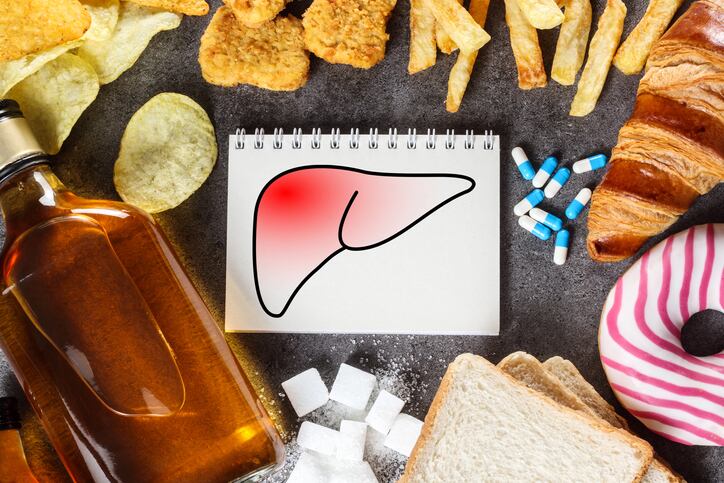Non-alcoholic fatty liver disease (NAFLD), renamed metabolic-associated fatty liver disease (MAFLD) in 2020, is a chronic and progressive metabolic disease characterized by excessive fat deposition in the hepatocytes in the absence of alcohol exposure or other identifiable causes.
The occurrence and development of MAFLD depend on multiple factors, including metabolic comorbidities, gut microbiome, and environmental and genetic factors.
Some functional foods and dietary supplements may decrease liver damage but there are inconsistencies in the results obtained by different studies.
A new review, published in 'Frontiers in Nutrition', aimed to clarify the overall effects of functional foods and dietary supplements in metabolic-associated fatty liver disease (MAFLD) patients.
Supplements and MAFLD
Recently, researchers have found that gut microbiota plays an important role in the pathophysiology of metabolic diseases, especially obesity-related disorders, including metabolic syndrome and MAFLD.
The hypothesis underlying its mechanism is that decreased microbial gene richness leads to a decline in bacteria producing short-chain fatty acids and an increase in bacteria synthesizing lipopolysaccharide, which can induce the development of steatosis and trigger systemic inflammation. Studies suggest early probiotic, prebiotic, symbiotic, and faecal microbiota transfer interventions may prevent MAFLD exacerbation.
Meanwhile, some investigations have reported that the intake of dietary supplements (such as vitamin D, vitamin E, and fatty acid) and functional foods (such as garlic powder, Nigella sativa, sumac powder, and olive oil) may ameliorate and/or reverse MAFLD, which may be due to their antioxidant properties. For example, organosulfur compounds in garlic powder and flavonoids in green tea extract belong to the category of functional foods, but in terms of properties, they exhibit antioxidant activities.
The review
Randomized controlled trials (RCTs) published in PubMed, ISI Web of Science, Cochrane library, and Embase from January 1, 2000 to January 31, 2022 were systematically searched to assess the effects of functional foods and dietary supplements in patients with MAFLD.
The primary outcomes were liver-related measures, such as alanine aminotransferase (ALT), aspartate aminotransferase (AST), and hepatic fibrosis and steatosis, while the secondary outcomes included body mass index (BMI), waist circumference (WC), triacylglyceride (TG), total cholesterol (TC), low-density lipoprotein cholesterol (LDL-C), and high-density lipoprotein cholesterol (HDL-C).
A total of 1,907 patients from 29 trials were included in this review. The articles investigated functional foods and dietary supplements (antioxidants including phytonutrients and coenzyme Q10 = 18, probiotics/synbiotic/prebiotic = 6, fatty acids = 3, vitamin D = 1, and whole grain = 1) were included.
Cumulative data suggests that antioxidants could significantly reduce WC, ALT, AST, and LDL-C increased in patients with MAFLD but had no effect on BMI, TG, and TC.
The authors suggest mechanism may be related to their antioxidant activity and the ability to scavenge free radicals, such as inhibiting the early formation of lipid peroxides in the liver, blocking the transmission process of free radicals by interrupting the chain reaction, or indirectly scavenging free radicals by acting on enzymes related to free radicals. For humans, it can reduce liver inflammation, decrease oxidative stress, inhibit lipid oxidation in serum, and finally reduce serum aminotransferase and improve serum lipids.
The analysis suggests pro-, pre- and synbiotic supplementation could decrease BMI, ALT, and AST levels but did not have beneficial effects on serum lipid levels compared to the control group.
Six randomized trials indicated that taking probiotic/symbiotic/prebiotic decreased BMI, ALT, and AST levels but did not have favourable effects on blood lipid levels compared to the control group. The results were inconsistent with the previous review. This difference might be related to the type of strains. Studies have shown that different strains have different effects on liver function and blood lipid levels. The review suggests the potential mechanism may involve regulating human metabolism by decreasing inflammatory markers and altering lipid profile. However, the dose and duration of their clinical application are ill-defined; therefore, more multi-central clinical research is needed to provide detailed guidance in the future.
Three RCTs reported the role of fatty acid supplementation in the treatment of MAFLD, but the results showed significant heterogeneity, which might be related to the dosage and durations of the trials, which ranged from ranged from 1,000 to 4,000 mg, and from 8 to 24 weeks. Therefore, additional trials are needed to demonstrate the effectiveness of fatty acids in MAFLD patients.
There were only a few articles on vitamin D in this study because several interventions combined physical exercise with other supplements had to be excluded. However, the authors say that at present, vitamin D appears to be an effective adjunctive therapy to improve liver function for NAFLD patients if combined with other treatments.
Limitations
This review has several limitations. Although the study showed that functional food and dietary supplements improved AST and ALT in patients with MAFLD, the source of all heterogeneity could not be explained by the subgroup analysis, especially most of the studies did not identify the stage of MAFLD and the included subjects in some studies were from a single ethnicity- mainly from Asia.
Moreover, functional foods and dietary supplements used in these articles were produced in different countries with various dosages, which might have an impact on the results.
The authors say multi-center clinical research from different countries should be carried out to explore effective doses using uniform sources of functional foods and dietary supplements in the clinic.
Source: Frontiers in Nutrition
https://doi.org/10.3389/fnut.2023.1014010
"Functional foods and dietary supplements in the management of non-alcoholic fatty liver disease: A systematic review and meta-analysis"
Authors: Wang, L-L., Zhang. P-H., and Yan, H-H


